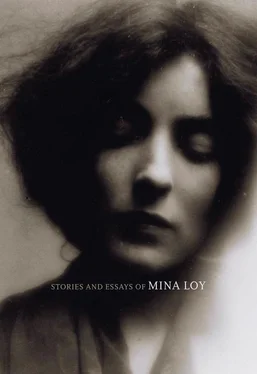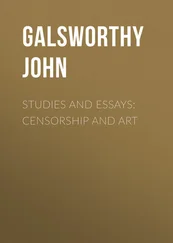Mina Loy - Stories and Essays of Mina Loy
Здесь есть возможность читать онлайн «Mina Loy - Stories and Essays of Mina Loy» весь текст электронной книги совершенно бесплатно (целиком полную версию без сокращений). В некоторых случаях можно слушать аудио, скачать через торрент в формате fb2 и присутствует краткое содержание. Год выпуска: 2011, Издательство: Dalkey Archive Press, Жанр: Современная проза, на английском языке. Описание произведения, (предисловие) а так же отзывы посетителей доступны на портале библиотеки ЛибКат.
- Название:Stories and Essays of Mina Loy
- Автор:
- Издательство:Dalkey Archive Press
- Жанр:
- Год:2011
- ISBN:нет данных
- Рейтинг книги:3 / 5. Голосов: 1
-
Избранное:Добавить в избранное
- Отзывы:
-
Ваша оценка:
- 60
- 1
- 2
- 3
- 4
- 5
Stories and Essays of Mina Loy: краткое содержание, описание и аннотация
Предлагаем к чтению аннотацию, описание, краткое содержание или предисловие (зависит от того, что написал сам автор книги «Stories and Essays of Mina Loy»). Если вы не нашли необходимую информацию о книге — напишите в комментариях, мы постараемся отыскать её.
Stories and Essays of Mina Loy
Stories and Essays of Mina Loy — читать онлайн бесплатно полную книгу (весь текст) целиком
Ниже представлен текст книги, разбитый по страницам. Система сохранения места последней прочитанной страницы, позволяет с удобством читать онлайн бесплатно книгу «Stories and Essays of Mina Loy», без необходимости каждый раз заново искать на чём Вы остановились. Поставьте закладку, и сможете в любой момент перейти на страницу, на которой закончили чтение.
Интервал:
Закладка:
Charity treats to the wholesomer plays have a highly educational value.
—“Somewhere where? In the dark. A boy looking in at a window — ” He had known all this before.
“When? Where? — —”
Then he remembered.
“Who are you?” asked the woman with the candle yet again.
“I’m,” said Jacky Sider
“Peter Pan.”
“But what—” she asked, so taken aback that this statement had no time to sound unnatural, “—ever do you want?”
“Jus’ to ’ave one look into one o’ them ’appy nurseries.”
It was only lately that she had had a chance to be a mother — Hyde Bates was really here tucked downily into his bed — and the factitious maternity stirred that deep something within her, that stirs in real mothers — whenever it does.
It was an entirely new and satisfying sensation, and she was not averse to staging its effect.
“Why you poor motherless creature,” she cooed, raising the windows, and holding the candle to Jacky’s face.
No his eyes were not upwardly angelic like “her” dear Hyde’s — but shining now in his relief, to their usual warmth of liveliness, he looked, “just a loveable young rascal, all mischief, with not an iota of harm in him, the dear fellow.”
Jacky with her robust aid stepped into the room, and Long Sloan was never to know this particular compensation again.
+
He felt as soldiers back from the trenches felt, in their beds, as though he were falling through softness.
This pastel room offered itself to him like a cheek.
Mrs. Bates led him to the other boy’s bed. There where the prodigious lashes lay shrined, in something like lace. She could remember the Madonna as she bent above the bed, her hair which was loosened fell from her temples, veil-like. It was sparse hair and Jacky saw how it shone, not from itself like the women in the streets, but with a moderate shining that seemed to be applied to it.
“And now,” she proclaimed, having brushed those lashes devoutly enough with her lips, “You see the happy nursery.”
“Gawd,” said Jacky Sider, as the sleeper in subconscious disturbance, turned and revealed the back of his head.
“It’s a boy!”
Blue painted birds were everywhere about; he felt as though there must be a rush of them over his head, out of the room with him as he followed the mistress of the house downstairs, between the terraced frames of reticent gilt.
“Now,” said Mrs. Bates, switching on the lights which fell first upon huge silver bowls filled with rose-coloured roses; the very silver which had lured him here with his friends, “How about a little supper?”
But it was as if a voice was driving insistently into his brain.
“When you had taken away all you could?
“What about all that was left?
“What about all there would always be left?
“What about where it came from?”
And he seemed to rise before himself, emptying the ocean with a thimble — like a personage in some old story he had been told.
“— — A little supper?”
“I s’pose” said Jacky, looking round the room, “you couldn’t never get more’n you wanted?”
“I never got anything I wanted,” said Mrs. Bates, “until my angel upstairs — —”
“An’ ’ow’ve yer got all this ’ere, if yer don’t want it?”
“Why, that? — Oh well you see my poor father was a very rich man, he left me all sorts of things. I hardly noticed.
“I think I had better show you,” she said, contemplating the boy with a helpful air, “some pictures of all the other houses, this is only a cottage.”
She reached out for a vellum album lying on the table.
“This is my place in town — — and this — — here is —
“I have only shown you these,” she added, when they came to her Villa in Biarritz, “because I wanted to tell you that with it all, my father was not a happy man.
“I look upon it as a very great lesson.”
And Jacky, who seemed not to have heard, asked,
“Was yer father thrifty?”
“Thrifty? Well, yes, you might say he was thrifty; on a very large scale.”
“A, very — large — —” repeated Jacky with autohypnotic concentration, “Oh.” And at last, “Yes, I, understand.”
Meditatively he began to stroke the puce brocaded velvet covering the chair on which he sat.
“That’s very,” smiled his hostess, “very old.”
“Old?” he enquired, surprised.
“Ah,” she said, “there are things to which age gives greater value, and other old things which have no value at all.”
“Would you mind,” said Jacky earnestly, “saying that over again.”
“— to which—” he repeated after her musingly, “—age— Yer mean its jus’ bein’ old stuff? — gives greater — value— And is value the same as wot is price?”
“It is,” smiled Mrs. Bates benignly.
He ate in silence some more of the chicken in aspic she had given him. Their light of loveable mischief had dimmed to reflections more profound as he raised his eyes to hers.
“D’yer know, mam,” he said, “Something must ’ave sent me to yer. To prevent me from going wrong.”
She was all surprised. Youths, she reflected, seemed as a genus to have spiritual attributes she could never have guessed. She felt suddenly glad that she had on the outset of her discoveries secured, however, the very best.
This was very nice of course, but after all, nothing, compared to Hyde who had wanted—“To make the whole world smell of flowers.”
Mrs. Bates was by nature a mono-maternalist.
“I’ve learnt more to-night,” concluded Jacky, “than I never ’ave.”
+
The atmosphere of the rag-shop was rather disturbed, on the morrow. A motherly heart having invited the tired lad to sleep on the library couch — he had lost himself from a picnic he had told Mrs. Bates, “dreamin’ of Peter Pan”—and given him a goodly breakfast—
It was eleven o’clock before Jacky burst into his home.
He found it had shrunk. It was somehow smaller than himself.
“Go’ mercy me,” cried Mother Sider, “To think I might really ’ave giv’ birth to a criminal — at this time o’ the mornin’. ”
She was frightened by some awesome change in her son, who seemed to be catching his breath.
“Muther,” he demanded in a stormy whisper, “ ‘As it ever struck you how much much richer the ’onest ones is?”
“Rich, rich, I never ’ad nothing to do with it—‘rich’!”
+
The ego of Ian Gore found nothing at all in his surroundings to utilise in the structure of the visible edifice of his spirit. Not even the coins that so much more properly came his way, than for Jacky Sider, could he make serviceable.
There was, according to him, “no intrinsic beauty within range of the parasites on the shop-keeper.
“The artist out of his own brain and his own sinews had made for his own spiritual indulgence all that has been appropriated by culture.
“A drop of his sweat transforms to fabulous fortunes — in the simulacrum of our understanding— The seventh wonder of the world of Croesus proceeds unaided out of his eye. Everything of superlative value must be formed from nothing.”
His clean sweeping attitude to the world in which he found himself was that it had not yet been made. —
Even the darling girls in the dust of urban spring must wait for seductiveness until they should be “made over” by him.
Nor was there any horticulture for his passions in the temperate zone of his parents’ marriage.
There was no lurking penetralia of their home to intrigue his pubescent fancy to define. No warmth of shadow receding from the daily habitude.
Mr. and Mrs. Gore were reserved, as people who have no reserves. Their household gods were so sanctified that they had never known their names. Counterpoised and empty scales. Loving and respecting each other for having done a dirty thing, and for, that the bonds of matrimony had made of it as if it had never been. Ian’s mother always spoke of “your father” as though he had something ominous about him, and concurrently a dispensation from Providence.
Читать дальшеИнтервал:
Закладка:
Похожие книги на «Stories and Essays of Mina Loy»
Представляем Вашему вниманию похожие книги на «Stories and Essays of Mina Loy» списком для выбора. Мы отобрали схожую по названию и смыслу литературу в надежде предоставить читателям больше вариантов отыскать новые, интересные, ещё непрочитанные произведения.
Обсуждение, отзывы о книге «Stories and Essays of Mina Loy» и просто собственные мнения читателей. Оставьте ваши комментарии, напишите, что Вы думаете о произведении, его смысле или главных героях. Укажите что конкретно понравилось, а что нет, и почему Вы так считаете.












